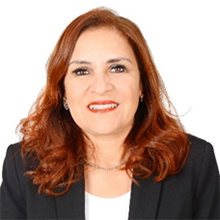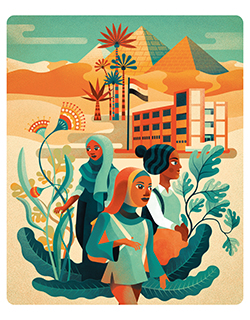
By Dr. Amal El-Sisi, Professor of Pediatrics Cairo University and honorary program director of “United to End Cervical Cancer in Egypt”
Three years ago, I was talking to a mother in my clinic confused by the contradictory messages she was hearing about the HPV (human papillomavirus) vaccine. On the one hand, she had heard about the effectiveness of the vaccine to guard against cervical cancer. On the other hand, she had also heard about the stigma surrounding the vaccine – a stigma related to sexual promiscuity.
Cervical cancer, the fourth most common cancer among women, is caused by HPV, a sexually transmitted infection. Cervical cancer is preventable through vaccination, screening, and treatment, but faces stigma, even among medical professionals, due to religious and cultural norms.
I am not a community (i.e., preventive) pediatrician; my practice is mainly in hospitals with acutely ill children. However, I was intrigued by this mother’s story. It brought back memories for me of when I was living in another country and my daughter had received the HPV vaccine. If we had lived in Egypt at the time, she might not have received it. It is unfair that circumstances control the health status of many people around the globe. Health equity is a must.
As a Rotarian and health professional, I feel it is my duty to spread awareness and do good in the world. I surveyed fellow pediatricians at a pediatric conference I regularly attend. Only 5% of respondents said they prescribed and recommended the vaccine to their patients. The situation was no better among obstetricians.
I learned that 145 countries are vaccinating girls, protecting them from cervical cancer. Furthermore 80 of these countries are vaccinating gender neutral – both boys and girls – to protect from different cancers. On further exploration of the problem, we found out that there are many challenges. The HPV vaccine is not part of recommended vaccination by pediatricians and obstetricians in Egypt. In addition, ignorance, stigma, and the fact that they are often not endorsed by health care providers keeps many people in Egypt from getting the vaccination.
I am but one person and I have a mission. As Rotary members, we are a village, and we are more powerful.
We started to include HPV and cervical cancer awareness in all our medical convoys – teams of medical professionals led by Rotary clubs who travel to remote areas to provide consultations and prescribe medications. We urged other Rotary clubs to do the same and have since led 20 convoys to different parts of Egypt. We started awareness campaigns among Egyptian Rotarians (2,900 members) and Rotaractors (600 members) and conducted 40 Rotary awareness events. Most Rotarians in Egypt are now well informed. Furthermore, we now have a group of 80 advocates made up of health professionals and dedicated Rotarians who we call the “Cervical Cancer Champions.”
We have also partnered with societies of cancer survivors and held two awareness events. One was a recreative trip to Hurghada. Hoda Galal, a Rotarian and survivor of cervical cancer, shared her story. “My personal goal is to share my story and become a ‘Pillar’ of hope to someone else, knowing that I have the power to help eradicate cervical cancer mortality rates and make a difference,” she said.
The events aren’t just about letting people know about early cancer screening tests, they are also about dispelling the stigma attached to this kind of cancer. As conservative as our society is, we carry provincial attitudes and morays regarding the female reproductive system. We as advocates are adamant to break down barriers. These stigmas can lend a hand in the disproportionate amount of needless suffering due to this cancer.

We applied for and were awarded a US$2 million Programs of Scale grant by The Rotary Foundation and other funding agencies. We will use the award to reach 4 million people with awareness campaigns, distribute 32,000 vaccines to girls ages 12-15, and screen 10,000 women for cervical cancer. We are determined to pave the way for the government to implement a national immunization program.
I have spent so much time advocating for the HPV vaccine because I believe we can eradicate HPV-related cancers through vaccination.
I love that the Rotary community aligns with my passion to reach as many people as possible and that members around the world are advocating for the elimination of cervical cancer.
I am but one person and I have a mission. As Rotary members, we are a village, and we are more powerful.
Learn more about what you can do to prevent cervical cancer for Cervical Cancer Awareness Month in January.
https://blog.rotary.org/2024/01/04/preventing-cervical-cancer-through-vaccinations/
